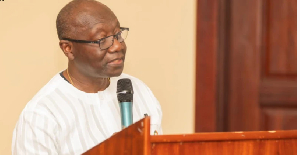The Customs Division of the Ghana Revenue Authority has attributed majority of the plight that befall importers at the ports of Ghana to ignorance of customs laws and procedures at the ports of Ghana.
According to the Chief Revenue Officer, in Charge of State Warehouse, George Tettey, this can be significantly mitigated if importers approach customs for the necessary information.
He lamented that unfortunately many only approach Customs when they have ended up in trouble or are feeling the consequences of inappropriate or non-compliant procedures and usually that, is at a point where the situation cannot be salvaged.
Mr. Tettey called on importers to make use of Customs client services desk at the various customs offices to make all the necessary enquiries when unsure of certain requirements under the various customs regulations.
The Chief Revenue Officer in Charge of State Warehouse, who was speaking on the Eye on Port program, made this appeal when addressing the issue of an aggrieved importer who claimed his container had been stolen at the Tema Port in an interview with broadcast journalist, and video blogger Kofi Adomako, on Kofi TV.
The said importer lamented that although he had paid duties twice, his container was not available for his retrieval when he went to the Tema Port.
Upon investigation, it was revealed that this importer forfeited his goods after non-payment of duties within the stipulated 21 days’ grace period given general goods for clearance in section 53 of the Customs Act 891. The said importer also said he had bought an auctions’ chit from someone in an attempt to retrieve his confiscated cargo.
Again, the Chief Revenue Officer revealed that this is not acceptable behaviour within customs regulations and that could lead to falling prey to fraud.
He emphasized that cargoes that are not cleared at the ports of Ghana within the stipulated 21 days for general goods and 60 days for vehicles, are by law forfeited which implies that they are the property of the state and not stolen by anyone as it's been assumed.
According to him, when forfeited cargoes are confiscated, examination and valuation are done for about a 3-month period whereafter, goods are enlisted and gazetted for public auction.
He said within this period, an importer who has lost his uncleared cargo to the state, could apply to customs via the Commissioner-General of the Ghana Revenue Authority to make considerations based on the assessment of the importers’ plea.
The importer in this case may be granted the opportunity to either begin the clearance process again to clear his cargo where he would have to satisfy the fees of the various service providers in the clearance chain.
Alternatively, in the case where duty payments have been made after forfeiture of goods, he could be given a replacement of other forfeited goods of equivalent value.
The said importer at the point of his interview had not written to the Commissioner-General to plead for a chance to retrieve his cargo.
According to George Tettey, if the said importer had approached customs on what to do on time, he would have more favourable options to himself.
Business News of Wednesday, 17 February 2021
Source: Eye on Port













